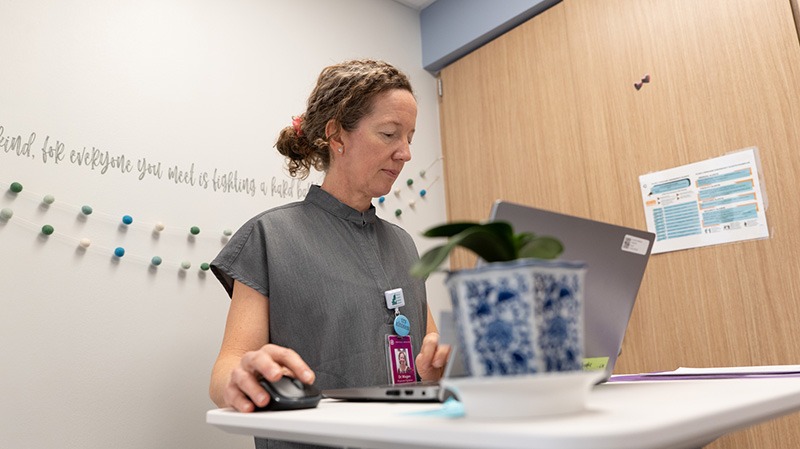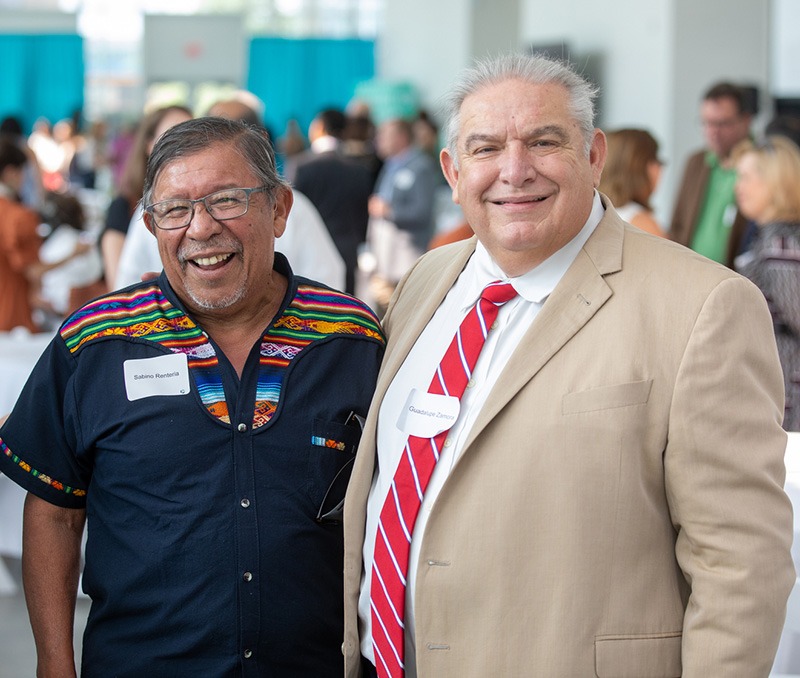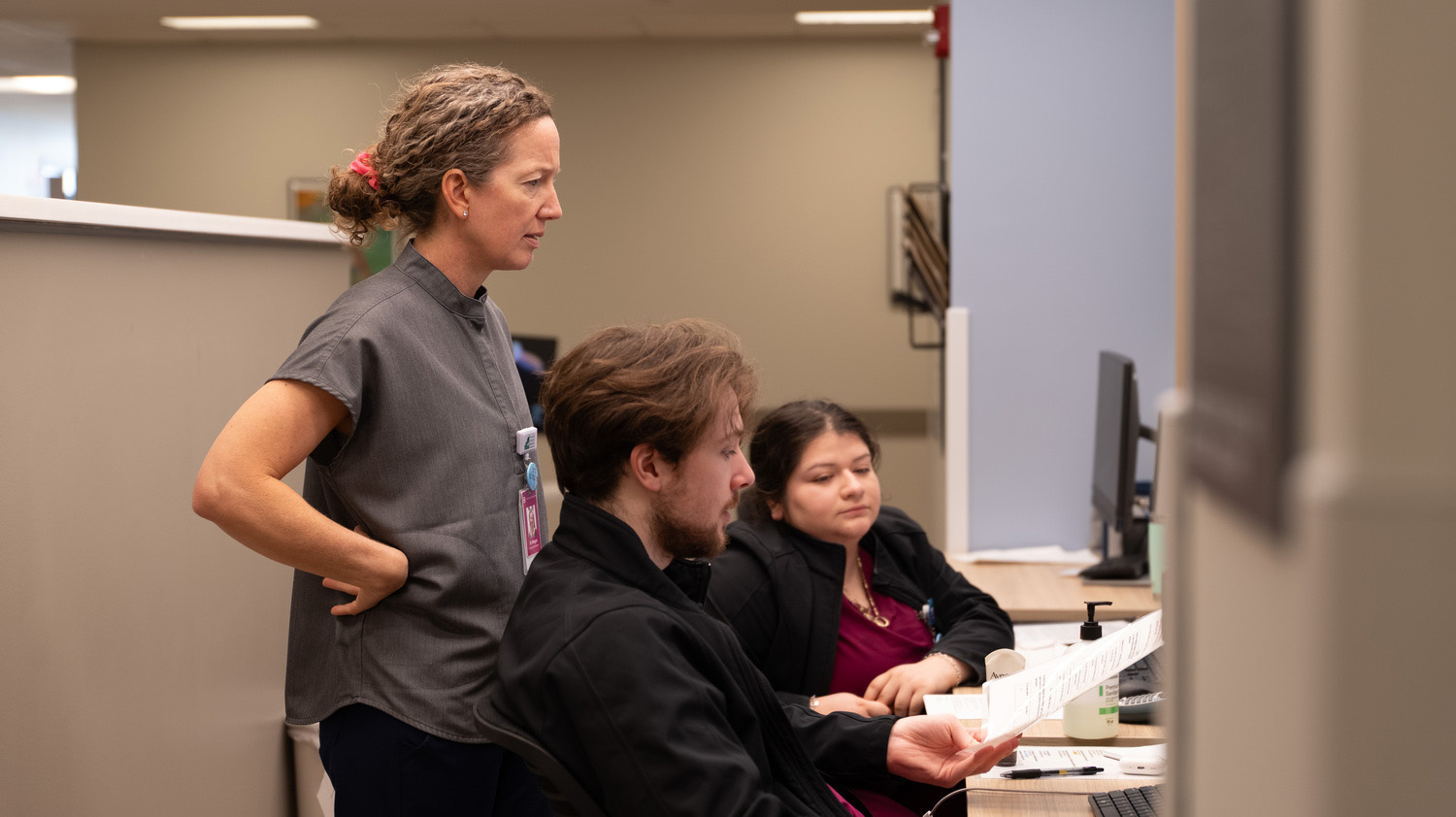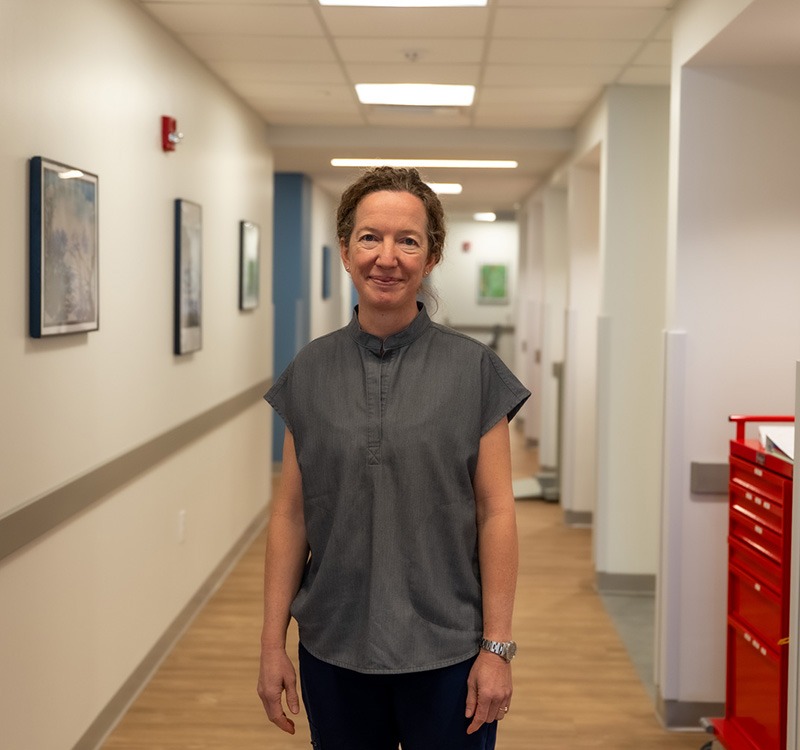March 24, 2025
Dr. Brooke Wagen was one of 50 graduates in the first-ever class at Dell Medical School in 2020. She now works inside Central Health’s Supportive and Palliative Care department.
By Cory Mull
When Dr. Brooke Wagen was interviewing for a spot in the first-ever class at Dell Medical School in 2016, she was asked whether she had applied to any other programs.
“Well, no,” she said. “My family’s here.”
At 39, Dr. Wagen didn’t look like most other applicants. She was a wife, a mother to three, a Meals on Wheels volunteer, a devoted churchgoer, and a Spanish interpreter for her East Austin neighbors during their doctor’s visits. On a larger scale, she used her fluency on mission trips to Guatemala.
Dr. Wagen knew she was entering a different world when she decided to return to the med-school dream she once had as a college graduate in the 90s, as a young woman from New Mexico with degrees in biology and Spanish.

“I had to step away and figure out who I was,” she said.
But through marriage, through kids, and through life, she decided to believe in that dream again. Fate seemed to intervene when she voted for “Central Health Proposition 1” in 2012 to support a new medical school in the city—a vote that would result in the creation of the Dell Medical School at The University of Texas at Austin.
“You know, your life won’t be the same after you go to medical school,” the admissions interviewer said.
“That’s OK,” Dr. Wagen replied. “It doesn’t need to be the same, but it needs to be here because this is where I live.”
Nearly a decade later, after becoming a part of the Dell Med’s inaugural class–one of 50 students from ages 20 to 39 chosen from 4,500 applicants–Dr. Wagen is now a physician on Central Health’s Supportive and Palliative Care team, a clinical service offering an extra layer of support for patients in Travis County with low income who are going through chronic illnesses.
She’s also the first Dell Med graduate to be hired by the safety-net health care system, starting with Central Health in August of 2024.
“I often tell my patients I’m the doctor who is able to step back with you and look at your life from a 10,000-foot view,” said Dr. Wagen, now 48. “I say to them, ‘What’s going on, and why does this matter? How can I help?’”
The road to critical care
Dr. Wagen graduated from Dell Medical School’s M.D. program in 2020, but a steadfast belief in her mission would keep her in Austin. She matched with the residency program at Dell Med in internal medicine, where she would go on to spend long days inside the Dell Seton Medical Center at the University of Texas and forge her identity as a physician, before finishing with a one-year hospice and palliative medicine fellowship—a program at Dell Med which trains physicians to care for patients with terminal illnesses and quality of life. Fellows also focus on improving health equity and social determinants of health.
“The unique thing about Brooke, even as a medical student,” said Dr. Tim Mercer, the co-director of high risk populations for Central Health and the chief of the Division of Global Health in the Department of Population Health at Dell Med, “was that she had a clear vision of who she was in the world and what she wanted to do in medicine.”
Dr. Wagen spent the next four years of her life learning and working at facilities like Ascension Seton Medical Center, Dell Seton Medical Center, Hospice Austin, and the Central Texas Veterans Health Care System, filing every situation away in her brain—her own internal Rolodex. Dr. Mercer, who later became Dr. Wagen’s co-worker at Central Health, said it was always evident how she would impart change.
“We [Brooke and I] believe very strongly in our role as physicians and enacting social justice and caring for the underserved,” Dr. Mercer said. “We were aligned in that mission early on.”
Dr. Wagen’s first day in residency at Dell Seton Medical Center was not easy. It came at the peak of COVID-19, and she found herself outfitted head-to-toe in personal-protection equipment–gloves, a face shield, a surgical gown, an N95 mask, and eye protection–inside the Emergency Room Trauma Bay at Dell Seton Medical Center.
Early on, there was a patient brought in by EMS, gasping for air. He needed a ventilator. He may have been dying.
“Who’s your family? Who can we call to give updates?” Dr. Wagen said to him.
The man pointed.
“Mi bolsillo.”
“I don’t really know what I learned from looking at his wallet,” Dr. Wagen remembered of the day. “But the man was on a breathing machine within a few minutes, and I do not remember what happened, because it was just patient after patient after patient.
“I never forgot that moment.”
For years, Dr. Wagen’s instruction prepared her for that scene, shaping the way she understood disease and care. But to live it was the human experience. From that period on, and from many others across the safety-net hospital system, she was able to form the hallmarks of her expertise in care for patients.
“I often tell my patients I’m the doctor who is able to step back with you and look at your life from a 10,000-foot view. I say to them, ‘What’s going on, and why does this matter? How can I help?’”
“The thing I know that I did (for patients), was that I was comforting their families,” she said. “I would call them every day and I would talk to them in Spanish about what was happening … I had friends at the time say, ‘It seems God meant for you to go to residency right now. You graduated at the perfect time.’”
Finding Medicine Through Connection
Dr. Wagen has always had the itch for medicine.
When her boys were little, she took them to Dr. Guadalupe Zamora at his family care practice just a couple blocks down the road from where they lived. A 12-year member of the Central Health Board of Managers, Dr. Zamora has practiced medicine in East Austin for over 20 years.
Dr. Wagen says she has always felt a special bond to primary medicine, and especially to Dr. Zamora’s neighborhood clinic, because of the way patient relationships and care settings were built and formed. Years later, while she was at Dell Med, her primary care mentor and supervisor became none other than Dr. Zamora.
“I don’t think that was chance, either,” she said.
She remembers long days, in her second and third years of residency, working across hospital facilities and in specialty surgery centers, but ultimately always coming back to Dr. Zamora’s office to see patients.

“She said she wanted to get to work,” Dr. Zamora said, “And I said, ‘Come on over. Come see some patients.’”
It was through Dr. Zamora, her own research, and a lived-in experience in Austin, that Dr. Wagen said she learned much more about Central Health.
“It perfectly aligned with my vision for what I wanted to do with my new medical training,” she said. “When I was interviewed for and got into Dell, I was given a shirt. I can remember this very clearly. (The shirt said) ‘Rethink …’ And I wrote on the shirt, ‘Providing concierge-level medicine for Austin’s oldest poor.’”
When Dr. Wagen began her studies at Dell Med, supportive and palliative care did not formally exist at Central Health. But by the time she graduated in May of 2020, after special legislation in 2019 sponsored by then State Senator Kirk Watson and State Rep. Donna Howard allowed Central Health to hire physicians to provide direct health care to patients, Central Health was already planning which services were most needed within the hospital district’s core demographics.
Following the adoption of a new strategic plan in 2022, Central Health began working toward hiring physicians to lead all its newly planned service lines. Supportive and Palliative Care launched in February of 2024.
“Brooke has a heart of gold,” Dr. Zamora said. “She has always had a passion. She really wants to help people.”
The timing was impeccable, too.
“The pieces all fell into place,” Dr. Wagen said.

What’s Ahead at Central Health
There was life before Dr. Wagen became a doctor. And then there was life after. Very few things have changed since.
“I’ve stayed in the same house. Up until this year, I drove the same car,” said Dr. Wagen, who’s still married to her high school sweetheart Taylor, with whom she has three children – Corin, Ari, and Elaia. “All my neighbors know I went to medical school. They all yell at me, ‘How’s it being a doctor?’ Because they all remember when I wasn’t.”
In the time before she was a doctor, Dr. Wagen traveled to Guatemala for mission trips with a Christian nonprofit, acting as a translator for individuals who traveled hours by bus to receive care, almost all needing surgery, almost all needing a way to communicate to the Guatemalan doctors in a meaningful way. To this day, she says, she continues to take those trips to Central America, only her impact has continued to grow with each successive year.
“Every time I go to Guatemala, I get back to health care in its simplest form,” she said. “It reminds me of why I got into medicine. I keep getting reminded every time I go back.”
Her goals are to continue caring for patients the best way she knows how: with empathy, compassion, and authenticity, especially in their hardest moments.

“I heard Central Health was going to do specialty care,” Dr. Wagen said. “I wanted to do this. And of course, the pieces all fell into place. It’s the only job I applied for because it was a perfect fit.”
“I think people who go into the field of hospice and palliative medicine, we all have a pretty unique kind of origin story, and so there is definitely this sense of it being a calling,” said Dr. Michelle Owens, the director of specialty care for Central Health. “And I think Brooke has really exuded that. She’s just a natural at being able to bring a peaceful sense around her.”
Dr. Wagen is also paying it forward by teaching the newest students at Dell Medical School as a DOCS (Developing Outstanding Clinical Skills) Mentor. Right now, she oversees five future physicians.
“This is truly the manifestation of the original vision we shared when we asked the voters to approve Proposition 1 in 2012,” said Austin mayor Kirk Watson, who in 2012 was a state senator and leading champion of Proposition 1. “What Dr. Wagen exemplifies is exactly what we hoped would happen—med school graduates taking residencies in the area and ultimately choosing to establish their practice here. And that she chose to work for Central Health, delivering care to some of the most medically underserved members of our community, is a symbol of the success we wanted.”
As a physician, Dr. Wagen believes there is a difference in how Central Health is eliminating gaps in care through patient navigation across departments. She believes her admission and instruction at Dell Medical School, in her adopted hometown, also was meant to be.
“I think every patient who is going through something, whether it’s big or small in the eyes of a doctor, it’s always front of mind to the patient and their family,” she said. “I think everyone wants someone who’s not going to forget about them. For me, that means attending to what their most important concerns are.”
Not long ago, Dr. Wagen welcomed a patient into her office, an individual who was living with a bone-marrow disorder. She noticed on his charts that his kidney numbers were abnormal.
“Have you ever been told you have kidney disease?” she said.
“My primary care did once, but they never did much about it,” he replied.
Dr. Wagen told him to stay put.
She walked over to nephrology, which was located just a few doors down, and checked in with the Central Health team, letting them know about her patient’s history and information. They quickly responded, allowing his health care to be prioritized.
“He got the labs the same day in our building” Dr. Wagen said. “And that’s awesome.”